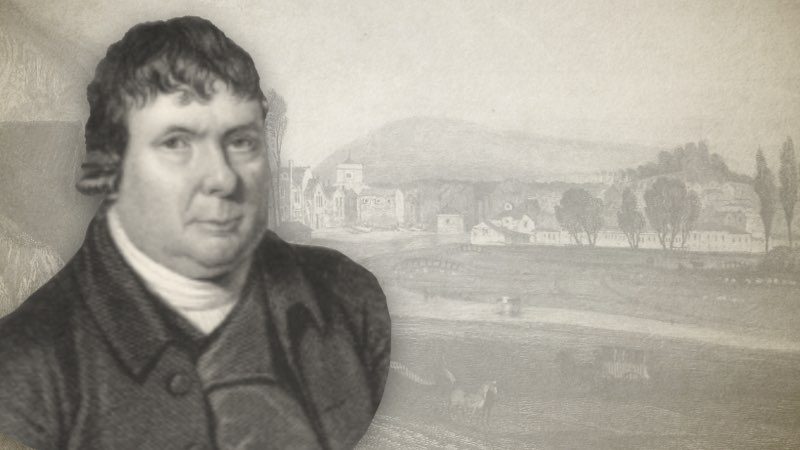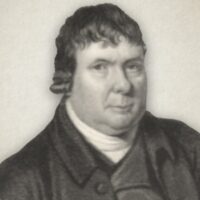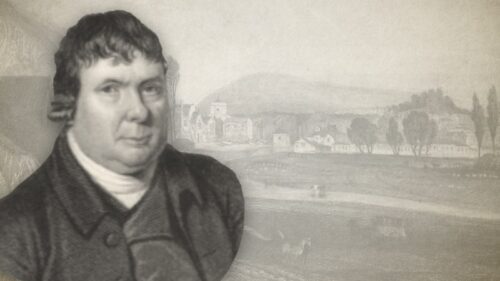
The Child of Liberty in Legal Bondage: Miserable Success (11/11)
11th head, Which is the miserable success that attends this legal labour.
All his striving against sin in his own strength is like Peter’s resolution, only betrays him into sin, and into the sieve of Satan; for without Christ he can do nothing. And every time he sins there is something fresh for the wrath of the law to work on, and fresh matter for conscience to accuse of; both which awaken his fears, and summon all his terrors about him. “If I sin, then thou markest me, and wilt not acquit me from mine iniquity. Thou renewest thy witnesses against me, and increasest thine indignation upon me: changes and war are against me,” Job, x. 14, 17.
Hardness of heart always attends this labour in vain. The poor creature may groan till his breast-bone be sore, but his heart cannot melt; nor can he pour out either his soul, or one penitential tear, to God, without a ray from the sun of righteousness, and that is seldom more than momentary. Why hast thou made us to err from thy way, and hardened our hearts from thy fear?”
Cutting disappointments attend this legal labour. He promises himself rest in this place, but finds none; he expects relief from this book, and under that preacher; he thinks such a morning will bring, peace, and the next Sabbath will set all to rights. But none of his purposes stand. “My purposes are broken off, even the thoughts of mine heart,” Job, xvii. 11.
He is ready to conclude that his former experience of the divine favour was nothing but a trap, intended to set him as a fairer butt for God’s indignation, and that he will take an advantage of all his former humble confessions, and condemn him out of his own mouth. “He hath bent his bow, and set me as a mark for the arrow,” Lam. iii. 12.
A self-righteous spirit works sadly in the soul at such times as these. He will vindicate himself, and cast all the blame upon God. “Wilt thou disannul my judgments? Wilt thou condemn me, that thou mayest be righteous?” Job, xl. 8.
Sad darkness and ignorance attend the soul under this legal bondage; and yet such souls have much pride and self- conceit. Hence Job is charged with “darkening counsel by words without knowledge,” Job, xxxvii. 2; “uttering things which he understood not, things too wonderful for him, which he knew not,” Job, xlii. 3.
There is in such a soul a strife with the Almighty, and a disapprobation of his measures; a censuring his providence, and an arraigning of his conduct. But “whoever hardened himself against him, or whoever strove with him, and prospered? Why dost thou strive against him? For he giveth not account of any of his matters,” Job, xxxiii. 13.
This is deep calling unto deep, one trouble answering another, and the ill success attending it. This bringing forth wind is all the fruit produced by one entangled with this yoke of bondage; who labours to get victory over sin by his own arm, and to get peace and comfort from his own performances. One believing view of Christ, or one propitious look from Christ, and nothing else, will deliver a soul from this grievous, this galling, yoke of bondage.
1. I shall now mention a few things that generally precede, or go before, this yoke of bondage, as procuring causes of it; and one is an itching ear. The Galatians and the Corinthians were not satisfied with the truth, nor yet with the apostle; and there-fore got this legal leaven by the ministers of Satan. They turned their ears from the truth that maketh free, and got the law that genders to bondage.
2. Rash and unrighteous censuring and judging of the Lord’s people, making his preachers offenders for a word; or for condemning what they never felt, what they never understood, and what they cannot disprove, is most sure, in the end, to bring on this yoke, and themselves at the bar of judgment; for to condemn the just is an abomination to God. Hence the caution-“Judge not, that ye be not judged; for with what judgment 15dc ye judge, ye shall be judged,” Matt. vii. 2. A man who judges in spiritual matters must be a person of good experience in church authority and of good discernment; and one who has truth at the root, truth in view, and the honour of God, and not his own, at heart.
3. Prejudiced conceived, and enmity cherished in the heart, against a preacher, or against a brother, without a just cause, or even if there be a real cause, is sure, sooner or later, to bring on this yoke of bondage. The servant that obtained forgiveness for ten thousand talents, could not forgive his brother the debt of five hundred pence; he was therefore delivered to the bondage of the law, the wrath of God, the lashes of conscience, and the darts of Satan; all which tormented him till he could yield that submission and resignation to God, and that affection for his brother that is due unto God, and to his brother for God’s sake. “Never,” says a wise man, “judge another till thou hast put thyself in his place,” lest, when “thou judgest another, thou condemnest thine own self. And thinkest thou this, O man, that thou shalt escape the judgment of God?” Romans, ii. 1, 3.
4. Reading erroneous books, and attempting to be “wise above what is written,” has betrayed many into the entanglement of this yoke of bondage; when a false fire, and fresh views of things, have wonderfully enamoured them, bringing fresh sparks of light and heat, whilst the old fire from the altar, and the good old wine, have been uninflaming and unpalatable to them, and they have been charmed till they were poisoned, and have been, like “Ephraim, broken in judgment,” by willingly following “after the commandment,” Hosea, v. 11; after the doctrines and commandments of men which turn from the truth.
And now I suppose my reader, if he be a man that fears God, a person of any long standing in the church of Christ, and in any measure acquainted with divine tuition, will hardly believe that the author of this discourse, who has been twenty-two years in the school of Christ, twenty one in the ministry, and has gone through the various operations of the spirit of bondage as herein related, and who has compared notes both with the Bible and with Bible saints, should be counted a liar for all this, and be traduced as a misguided and misinformed man, and as one who traces things up to God and to his holy law, which can only be traced up to Satan and to the corruption of the human heart. Therefore I submit what I have written to God, and to the judgment of wisdom’s children. And, if it be false, let Mr. Hacker, whom God is now making, manifest, “prove me a liar in all this, and make my speech nothing worth.” If he can overthrow what I have here advanced, and prove all those things, which the Holy Ghost attributes to God, to be applicable only to Satan, and all that the scriptures apply to the law to be only the working of corruption, then the work is done.
But we are told, that “a believer’s re-entanglement by the moral law is inconsistent with the abolition of it.” Then this inconsistency is to be found in the word of God; and let them who are wise above what is written disprove it, or cast the blame there.
That the law is abolished and done away in Christ, the scriptures witness, 2 Cor. iii. 13. That the Galatians, who stood not fast in their liberty, but were leavened with legal leaven, were going to be entangled again with the yoke of bondage, Gal. v. 1, is scriptural also. So that this inconsistency is founded upon the very letter of scripture text. “Beware of the leaven of the Pharisees,” says the Saviour. “You suffer if a man bring you into bondage,” 2 Cor. xi. 20. “False brethren were brought in, who came in privily to spy out our liberty which we have in Christ Jesus, that they might bring us into bondage,” Gal. ii. 4. “Why tempt ye God to put a yoke upon the disciples necks,” Acts, xv. 10, “by compelling them to be circumcised and keep the law?” Acts xv. 5. But, if there be no such thing as a yoke of bondage to re-entangle a believer, then the apostles were in no danger by these false brethren, nor the Galatians neither. But this inconsistency is not only to be found in the Bible, but in the experience of God’s children. Luther found enough of it, as appears in his comment on the Galatians. And I have felt so much of it since I could call Jesus my Lord and my God, that I declare in the presence of God, I would not go through it again for a thousand worlds. But it was God’s will that I should know law from Gospel, not only in my head by the scriptures, but in my heart by their different operations. Paul knew what it was to go bound in the spirit, and what it was to be made “all things to all men; as under the law;” to them that were under the law;” and what it was to warn sinners “for three years night and day, with tears.” And I much question if there is one child of God in this nation, twenty years old in grace, that has not felt this yoke, or at times been more or less influenced with a spirit of bondage. Thus this inconsistency is to be found in the Bible, and in the experience of all the saints of God: but there is a worse inconsistency to be found in graceless professors, and that’s, “promising others liberty while themselves are the servants of corruption.”
William Huntington (1745-1813) was an English Calvinist preacher and prolific writer. His influence spread across the country and denominational lines. John Hazelton wrote of him—
“He published one hundred books, large and small, and once mentions being "weary at night, after having been hard at writing for fifteen hours during the day." Henry Cole wrote of him—‘’It may be asked why in my ministration, such as it is, I make frequent allusion to the ministry of that great and blessed servant of the Most High, the late Mr. Huntington. The reasons are these—1st. Because I believe he bore and left in Britain the greatest and most glorious testimony to the power of God's salvation that ever was borne or left therein. 2nd. Because I believe he planted the noblest vine of a Congregational Church that ever was planted therein; and 3rd. Because I believe the Churches that maintain the vital truths he set forth form a very essential feature in the Church-state of Christ in the land in these times, and perhaps will do so to the time of the coming day of God's retribution."
William Huntington, The Child Of Liberty In Legal Bondage (Complete)




